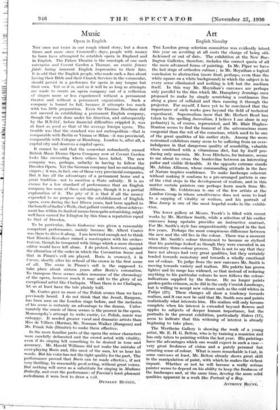Music Opera in English NOT once nor twice in our
rough island story, but a dozen times and more since Cromwell's days, people with money
to burn have attempted to establish opera in England and
in English. The Palace Theatre is the cenotaph of one such enterprise and Covent Garden a Thamar, an exotic femme fatale luring innocent English impresarios to their fate. It is odd that the English people, who made such a fuss about having their Bible and their Church Services in the vernacular,
should persist in a preference for opera in any tongue but their own. Yet so it is, and so it will be as long as attempts arc made to create an opera company out of a collection of singers more or less experienced without a permanent theatre and without a permanent organisation. Such a company is bound to fail, because it attempts too much with too little preparation. Even Sir ThOmas Beecham did not succeed in establishing a permanent English company, though the work done under his direction, and subsequently by the B.N.O.C. before financial difficulties crippled it, was at least as good as that of the average foreign opera. The trouble was that the standard was not metropolitan—that is comparable with Berlin or Vienna or Milan—it was provincial, comparable with Cologne or Hamburg. London is, after all, a capital city and deserves a capital opera.
It cannot be said that the somewhat redundantly named British Music Drama Opera Company now at Covent Garden looks like succeeding where others have failed. The new company was, perhaps, unlucky in having to follow the Dresden Opera. Yet the German company had no outstanding singers ; it was, in fact, one of those very provincial companies.
But it has all the advantages of a permanent home and a great tradition—not to mention a State subsidy. It is no excuse for a low standard of performance that an English
company has none of these advantages, though it is a partial explanation of it. The pity of it is that if all the money
expended to no purpose upon the establishment of English opera, even during the last fifteen years, had been applied to the benefit of Sadler's Wells, that gallant venture, whose achieve- ment has within its limited means been quite astonishing, might well have earned for Islington by this time a reputation equal to that of Dresden.
To be particular, Boris Godounov was given a reasonably competent performance, mainly because Mr. Albert Coates
was there to drive it along. I am heretical enough not to think that Rimsky-Korsakov ruined a masterpiece with his orches- tration, though he tampered with things which a more discreet editor would have left alone. I do protest, however, against
the alteration of the order in which the Coronation Scene and that in Pimen's cell are played. Boris is crowned, a /a Caesar, shortly after his refusal of the crown in the first scene
of all. The scene in Pimen's cell is the supposed to take place about sixteen years after Boris's coronation.
To transpose these scenes makes nonsense of the chronology of the opera, however much it may add to the glory of an exceptional artist like Chaliapin. When there is no Chaliapin, let us at least have the tale plainly told.
Mr. Coates gave us more of the Polish scenes than we have previously heard. I do not think that the Jesuit, Rangone, has been seen on the London stage before, and the inclusion of his scene is certainly an advantage to the drama. Unfor- tunately the music of these scenes is the poorest in the opera.
Moussorgsky's attempt to write exotic, i.e. Polish, music was unhappy. It needed greater vocal and dramatic artists than Miss de Villiers (Marina), Mr. Norman Walker (Rangone) and Mr. Frank Sale (Dimitri) to make them effective.
In the more familiar parts of the opera the minor characters were carefully delineated and the crowd acted with vitality, even if its singing left something to be desired in tone and accuracy. Mr. Harold Williams did not make the mistake of over-playing Boris and, like most of the men, let us hear his words. But his voice has not the right quality for the part, The
performance proved that Boris can be made effectivz, if not very thrilling, by reasonably good acting, without great voices. But nothing will serve as a substitute for singing in Madame Butterfly, and over the performance of Puccini's least pleasant melodrama it were best to draw a veil.
DYNELEY HUSSEY.














































 Previous page
Previous page